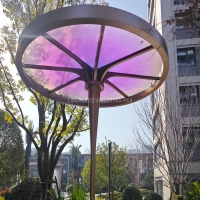Welcome to the website for landscape facilities products and knowledge.
What are the environmental impacts of producing landscape bar counters, and how are they mitigated?
The production of landscape bar counters, while creating beautiful commercial and residential spaces, carries a tangible environmental footprint. This impact is primarily felt across three stages: raw material sourcing, manufacturing processes, and product lifecycle.
Material sourcing presents significant ecological challenges. The quarrying of natural stone like granite or marble is an energy-intensive operation that contributes to habitat destruction, soil erosion, and generates considerable dust and particulate matter. Similarly, virgin wood extraction, if not managed responsibly, leads to deforestation and loss of biodiversity. The production of synthetic materials like engineered quartz also carries a high carbon cost due to the energy required for mining quartz and manufacturing resins.
The manufacturing phase further compounds these impacts. Fabricating stone and wood involves massive energy consumption, primarily from powerful cutting, polishing, and finishing machinery. This process generates air pollution from dust and water pollution from slurry—a mixture of water and fine particulate matter that can contaminate local waterways if not handled properly. Additionally, the transportation of these heavy materials across global supply chains contributes significantly to the product's overall carbon footprint.
Thankfully, the industry is actively mitigating these impacts through a multi-faceted approach towards sustainability. A primary strategy is the adoption of recycled and reclaimed materials. Countertops made from recycled glass, composite materials containing post-industrial waste, and reclaimed wood drastically reduce the demand for virgin resource extraction. This not only diverts waste from landfills but also lowers the embodied energy of the final product.
Sustainable manufacturing technologies are also revolutionizing production. Modern facilities employ closed-loop water systems to treat and recycle water used in cutting and polishing, preventing contamination. Dust collection systems and air filtration units are now standard, capturing up to 99% of particulate matter before it can be released into the atmosphere. Furthermore, manufacturers are increasingly powering their operations with renewable energy sources, such as solar or wind power, to decarbonize the fabrication process.
Certifications provide a crucial framework for accountability and consumer choice. Sourcing wood from forests certified by the Forest Stewardship Council (FSC) ensures it comes from responsibly managed forests that conserve biological diversity. Similarly, products certified by organizations like Greenguard ensure low chemical emissions, contributing to healthier indoor air quality.
Finally, the principle of a circular economy is gaining traction. Designing bar counters for disassembly and recycling at the end of their long life ensures that materials can be repurposed, thus minimizing waste and closing the resource loop. Through these combined efforts of material innovation, cleaner production, and certified sourcing, the industry is steadily reducing its environmental impact, allowing consumers to enjoy aesthetic design with a much clearer ecological conscience.
Related search:

Recommendation
Metal frame with gradient color acrylic combined with high-end shading landscape facilities